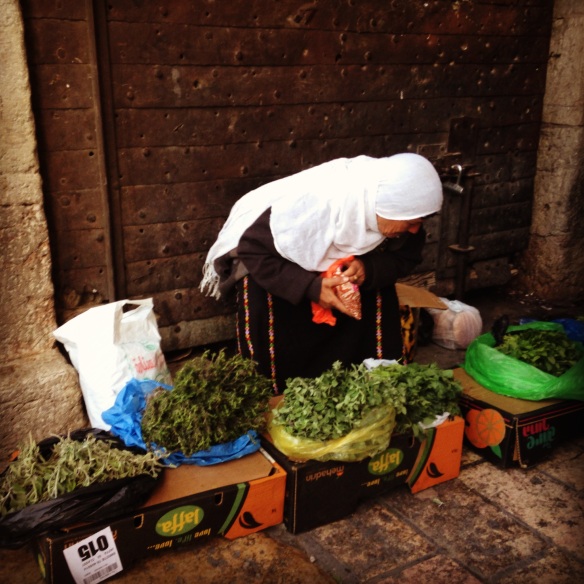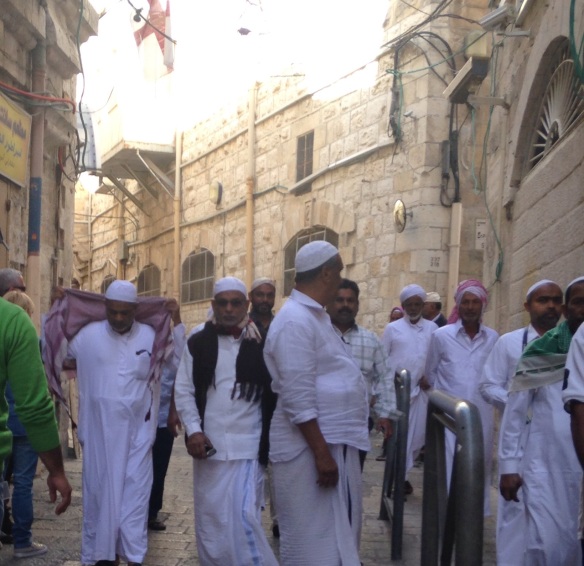Ok, so here’s the thing. Two years ago when I traveled back to the Holy Land, I didn’t know where the West Bank was. West Bank of what? And if the West Bank is so important, what’s up with the East Bank? Anything?
I didn’t know what, where, or why the settlements were so controversial. The Nakba? Is that a type of falafel? It was all Greek, (or, more accurately, Hebrew) to me.
I didn’t know the mean things Muslims had done to Christians, or Christians had done to Jews, or Israelis had done to Palestinians. Or what everyone had done to everyone else.
I also wasn’t aware of the kind or courageous, peace-seeking things anyone was doing.
I know, I know…It’s embarrassing! I’m not an uninformed adult. I know things. I’ve even been to seminary. But maybe when it came to the Middle East I was staring at a cute guy in history class while they were teaching the basics. And distracted with changing diapers and driving carpools and the drama of raising teenagers for, like, 20 years of THE PROBLEMS.
Sure, I had been years ago to see all THE PLACES Jesus walked and everything He touched and the exact sycamore tree that Zaccheus climbed. After all, I am an evangelical and I had my “To Do list in Order to be OK”.
That was then and this is now. Now I’m on a flight coming home after my third trip to the Middle East in two years. I know a couple of things, but only a couple, and even those I’m not sure of. What I’ve learned is about as much as a pre-schooler knows about calculus – maybe a few numbers. I’m familiar with some of the sources of conflict. I know a few dates and definitions. I’ve heard the personal stories of brave people with hard, hard experiences to share.
Thanks to travels with an organization called Telos, my mind is filled with rich, stimulating, discouraging and hopeful images from this past week when I had the privilege to sit with a Muslim sheik and also share Shabbat with a Jewish rabbi. I met with Israeli settlers and Arab refugees, and Messianic Christians, and Palestinian Christians, and Catholic nuns caring for abandoned Muslim babies from unwed mothers.
And I have no idea what to do with all of it. None.
I bring it to Jesus and ask, “How the heck am I supposed to figure out my tiny part (if indeed I have one) in bringing healing and reconciliation to a huge chunk of the world filled with people all suffering from PTSD?”
When I’m in the Middle East I feel like someone who grew up in Appalacia and has been invited to a fancy State Dinner. I’m not sure which fork to use, or what kind of wine people drink, or what is an appropriate topic for dinner conversation. It’s not only potentially embarrassing, it also feels dangerous. What if I say something that inadvertently hurts someone’s feelings and they want to kill me? Or makes them stop talking to all Americans, including John Kerry, for instance? It could happen! Who knows what I might say by accident?
But flying home through the night, across Europe and the Atlantic in the dark, I get a hint of something. Sitting next to me on this flight is an old Israeli woman who doesn’t speak a word of English except for “Help” and “Thank you”. We communicate in gestures and facial expressions and smiles. I lean towards her and try to understand what she wants to say.
She hands me her immigration form, her passport, and her driver’s license, miming writing, indicating she wants me to fill it out for her. Either that or she wants me to make a grocery list. She tries expounding in Hebrew (I think) even though I don’t understand a single word.
I fill out the form, fervently hoping I’ve got the information correct and she truly isn’t bringing any plants or drugs into the U.S., and she won’t get stopped going through customs.
She smiles and thanks me, nodding. As we get off the plane she continues to speak to me in Hebrew, like we’re best friends. She follows me through customs and doesn’t get arrested. International crisis averted.
As we part, I remember something a new friend said to us in Jerusalem. He is a Palestinian whose daughter was shot by an Israeli soldier and now he joins with other Palestinian and Israeli parents to forgive and work for peace. He said,
“People hate each other because they fear each other and they fear each other because they don’t know each other.”
It strikes me that maybe the one thing that people even as clueless as I can do is to continue to show up, and sit next to people very different from us, and listen hard, and try to understand a new language.
A girl’s got to start somewhere, right?






Laura, I’m so glad you’ve had this opportunity and appreciate your insights. That helpless feeling of “what do do”, strikes me so often and yet reminds me that in my weakness, He is strong. I think of the good old CPC axiom, “just show up” is such a freeing and reckless concept at the same time. For the effort we make and the weakness we acknowledge before God, he takes over. You asked God, “what is my part?” and he gave you a Hebrew woman to show his love to! Welcome back.
Ken Foster
Right on sister! You have hit the nail right on the head. It can and should be that simple.
Feels sooooo inadequate, but you do what you can, right?
Sis, you reminded me of how much we all want to fix things or at least be an itty bitty part of the solution. Certainly the Mideast is not something we can fix or even understand being westerners. Heck, the people in the midst of the crisis can’t get their heads around the situation. I love the fact you just “showed up” and in your pursuit of following Jesus, have been sensitized and will sensitize others to simply loving people as He does. Not much else we can do.
Thank you sweet David! Next time you come along!